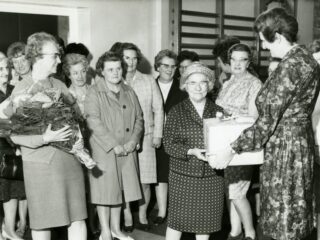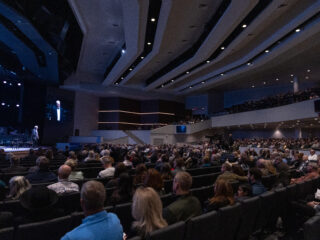When I was little, I thought God had computers. If God wanted it to rain in California, He would hit a few buttons and the radar would sweep across the scope bringing rain to California. In my little mind, this made perfect sense to me. Why? My dad taught radar systems in the Army and when he would take me to work with him we would go into a large room filled with computers and radar scopes. If my dad wanted to make something happen, he would punch a bunch of buttons, the radar scope would flicker, and then things would happen.
God must have a room like this, I thought. Only God’s room would be much, much bigger.
Having a dad who loved me without question or hesitation was a gift I have only recently begun to fully understand and appreciate. I learned to love Scripture by listening to my dad prepare to teach his Sunday School lesson. I learned about mercy by watching my dad help out neighbors and friends when everyone had given up on them. My dad never gave up on anybody.
When he died, my family and I stood in line for over five hours listening to person after person tell us stories about how dad had changed their lives. When my mom and I got in the car to go home, Mom said, “Where were we when your daddy was changing all of these people’s lives?”
“We were in the car, Mom,” I said, “honking the horn and yelling for Dad to hurry up.”
Believing in God came very easily to me and one of the reasons I was able to come to faith this easily was because I made the connection between God and my dad. God must love me, I reasoned, like my dad does, only bigger.
I was reminded of this when I started preaching at Kairos, a Tuesday night worship experience for young adults and noticed how many of these young adults had issues with their fathers. How bad were these issues? When I taught the Lord’s Prayer, we had to spend significant time on the opening phrase, “Our Father.” Many of these young adults were so traumatized by their fathers that they would stumble at the beginning of the prayer and be unable to move on. Their fathers had left them, abused them, or wounded them in such brutal ways that thinking about God as a father shut them down.
I ended up telling them “Father” was a metaphor, a word picture Jesus used to help us understand what we couldn’t understand — the nature of God. I said if the “father” metaphor doesn’t work, then find one that did work. Jesus gave us a lot of them — Shepherd, Warrior, King. Any one of those would work just as well in the prayer.
While I was talking to these young adults, I finally understood Paul’s teaching to fathers in Galatians 6. Remember the passage? Paul tells fathers not to “frustrate your children, but raise them up in the teachings of the Lord.”
“Don’t frustrate your children?” What kind of command is that? Couldn’t Paul have thought of something, well, more challenging? More manly? Is it just me or is Paul saying, “Dads, your kids will be just fine just as long as you don’t mess them up”? Where is the charge to raise up warriors for Christ? Champions for the kingdom? To be honest, I’ve always found Paul’s teaching to fathers a little disappointing. I was looking for something more, let’s say, inspiring.
But I finally understood what Paul was talking about. He was simply saying, “Dads, don’t make it hard for your children to believe in God. Dads, you don’t have to be perfect. You don’t have to be Superman, but don’t live in such a way your kids can’t think of God as a father.”
My dad wasn’t perfect. In a lot of ways, my dad never really understood me. He never understood my love for the arts. For him, Shakespeare made fishing equipment.
But he always loved me the best way he knew how and as the Bible says, love covers a multitude of sins. I was always able to say, “God loves me like my dad, just bigger.”
So, let me add to Paul’s encouragement to dads. Dads, you don’t have to be perfect. You don’t have to be successful or rich. You just have to love your children well enough so your children understand God loves them the same way, only bigger.









